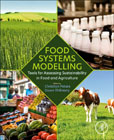
Food Systems Modelling: Tools for Assessing Sustainability in Food and Agriculture
Peters, Christian J.
Thilmany, Dawn
Food Systems Modelling emphasizes sustainability, including the impact of agriculture and food production on profits, people and environment, with a particular focus on the ability of humanity to continue producing food in the midst of global environmental change. Sections introduce the purpose of models, the definition of a food system, the importance of disciplinary, interdisciplinary, and transdisciplinary inquiry, cover specific branches of modeling in the sustainability of food systems, and wrestle with the challenge of communicating modeling research and appropriately integrating multiple dimensions of sustainability. This book will be a welcomed reference for food scientists, agricultural scientists, nutritionists, environmental scientists, ecologists, economists, those working in agribusiness and food supply chain management, community and public health, and urban and regional planning, as well as academicians and graduate students interested in the sustainability of food systems. Emphasizes sustainability, including the impact of agriculture and food production on profits Focuses on the ability of humanity to continue producing food in the midst of global environmental change Deciphers what models can teach us about food system sustainability INDICE: 1. Introduction - Using models to study food systems2. The origins, definitions and differences among concepts that underlie food systems modeling3. Life cycle assessment of foods and diets4. Water Footprint Assessment: towards water-wise food systems5. Land use modelling from farm to food systems6. Foodshed analysis and carrying capacity estimation7. Market and Supply Chain Models for Analysis of Food Systems8. Framing and evaluating the economic impacts of food system policies, programs and initiatives9. Environmental Input-Output (EIO) Models for Food Systems Research: Application and Extensions10. Modeling biophysical and socioeconomic interactions in food systems with the International Model for Policy Analysis of Agricultural Commodities and Trade (IMPACT)11. Using Social Network Analysis to Understand and Enhance Local and Regional Food Systems12. Participatory modeling of the food system: The case of community-based systems dynamics13. Using models to understand community interventions for improving public health and food systems14. Applying environmental models in the food business context15. Inquiry within, between, and beyond disciplines16. Conclusion: Towards a holistic understanding of food systems
- ISBN: 978-0-12-822112-9
- Editorial: Academic Press
- Encuadernacion: Rústica
- Páginas: 388
- Fecha Publicación: 24/01/2022
- Nº Volúmenes: 1
- Idioma: Inglés
